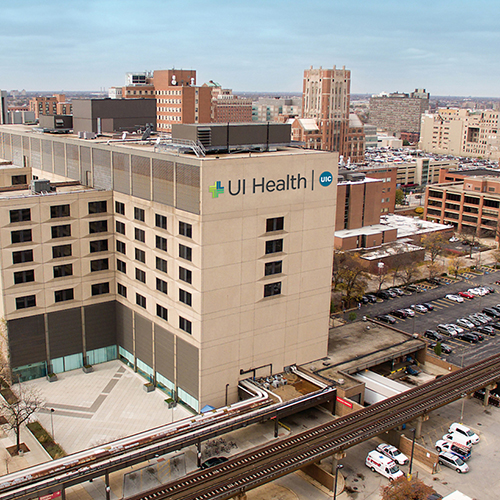| Location | Chicago, IL |
|---|---|
| Regional campuses | Peoria: Medicine | Nursing
Quad Cities: Nursing Rockford: Medicine | Nursing | Pharmacy Springfield: Nursing Urbana: Nursing |
| Founded | UIC was formed in 1982 by the consolidation of two U of I campuses: the Medical Center campus, which dates back to the 19th century and the comprehensive Chicago Circle campus which replaced, in 1965, the two-year undergraduate Navy Pier campus that opened in 1946 to educate returning veterans. More history of UIC |
| Status | Public Research University |
| Budget | $4.1 billion (FY 2025) | More budget information |
| Research | $509 million (FY 2023) More on research at UIC Research at a glance – printable version |
| Tuition and Fees 2024-25 full-time undergraduate |
Rates vary by program. U-PASS and U-PASS+ are optional. $16,076-$20,598 per academic year in-state (w/U-PASS) $16,448-$20,970 per academic year in state (w/U-PASS+) $31,662-$36,144 per academic year out-of-state (w/U-PASS) $31,994-$36,516 per academic year out-of-state (w/U-PASS+) Complete tuition and fee rates |
| Enrollment Fall 2024 | 22,495 undergraduates 7,252 graduate students 4,159 professional students 33,906 total More about enrollment |
| Degree programs Fall 2024 | Bachelor’s 94 Master’s 102 Doctoral 64 Certificates 82 |
| Full-time equivalent employees (2023) | Faculty: 2,694 Academic Professionals and Civil Service: 10,242 More about faculty and staff |
| Faculty | 88 percent of full-time faculty hold a Ph.D. or equivalent degree, and 91 percent of instructional faculty teach undergraduate courses |
| Team Name | Flames |
| Conference | Missouri Valley Conference |
| School Colors | Fire Engine Red and Navy Pier Blue |
| School Mascot | Sparky |
|
Institutional Accreditation |
The University of Illinois Chicago is accredited by the Higher Learning Commission (hlcommission.org), an institutional accreditation agency recognized by the U.S. Department of Education. |
University of Illinois Chicago
The largest university in one of the world’s most vibrant cities
The University of Illinois Chicago is an acclaimed research institution with 16 colleges dedicated to the discovery and distribution of knowledge.
Unleash your potential

For undergraduate students, UIC offers:
- 94 bachelor’s programs to explore your interests and find the right program.
- A low student-to-teacher ratio with 1 faculty member to every 18 students.
- Top-tier faculty and dedicated staff to help you prepare for a fulfilling career.
You belong at UIC
As one of the most ethnically and culturally diverse universities in the country, UIC’s welcoming environment gives you the chance to study, work and grow with classmates who will broaden your perspectives and worldview.
UIC’s mission
UIC provides the broadest access to the highest levels of intellectual excellence. UIC’s mission is:
- To create knowledge that transforms our views of the world and, through sharing and application, transforms the world.
- To provide a wide range of students with the educational opportunity only a leading research university can offer.
- To address the challenges and opportunities facing not only Chicago but all Great Cities of the 21st century, as expressed by our Great Cities Commitment.
- To foster scholarship and practices that reflect and respond to the increasing diversity of the U.S. in a rapidly globalizing world.
- To train professionals in a wide range of public service disciplines, serving Illinois as the principal educator of health science professionals and as a major healthcare provider to underserved communities.
Key facts
UIC is committed to diversity

UIC is one of the most diverse campuses in the nation and a national leader among urban, public higher education institutions in providing access to underrepresented students. UIC is focused on eliminating disparities in health, education and economic opportunity. Community engagement is a centerpiece of UIC’s urban mission. Faculty, students and staff in every college work with neighborhood, foundation and government partners on a wide range of projects to improve the quality of life in metropolitan areas around the world.
UIC is focused on accessibility

UIC is committed to increasing access to education, employment, programs and services for all and maintaining a barrier-free environment for individuals with disabilities.
UIC’s Disability Resource Center facilitates access for students through consultation with faculty and departmental staff and strives to provide all needed accommodations. Accessible workstations and assistive technology are available on campus through Technology Solutions and the UIC Library. Accessible transportation is also provided.
The Disability Cultural Center offers public programs, discussion series, arts-based workshops and one-on-one support to engage an understanding of disability issues as social justice issues, and disability as a site for identity, community and culture.
UIC is pledged to sustainability

As a charter signatory to the integrated climate commitment, UIC has pledged to reduce its greenhouse gas emissions 40% from 2004 levels by 2030 — and to be carbon-neutral by 2050. Further goals are to become a zero-waste, net-zero-water, biodiverse and transformative scholarship university.
UIC becomes greener every year — through plantings that have led to its designation as a Tree Campus USA each year since 2011 and becoming the first Bee Campus USA® in Illinois in 2017. The university continues to innovate and integrate sustainability into everyday operations through its commitment to LEED-certified buildings, recycling, active transportation and public transit. Bike-sharing stations are conveniently placed throughout the campus, which itself is located near three rail stations.
Sustainability is also incorporated into UIC’s education and research missions. The Office of Planning, Sustainability and Project Management offers students internships and serves as a clearinghouse for information on green jobs. Students can become an Eco-Educator, the office’s volunteer corps for promoting green practices.
UIC is known for
Being the largest university in the Chicago area, having 33,906 students enrolled in its 16 colleges.
In the 2025 U.S. News & World Report ranking of colleges and universities, UIC ranked tied for 40th among public national universities.
UIC is the top university in Illinois for value and social mobility, according to the Wall Street Journal/College Pulse 2025 Best Colleges in the U.S. ranking.

University of Illinois Hospital & Health Sciences System
The University of Illinois Hospital & Health Sciences System, known as UI Health, is UIC’s academic medical center and the state’s major public hospital. Located in the heart of the Illinois Medical District, UI Health includes a 455-bed hospital, Children’s Hospital University of Illinois, 26 outpatient clinics and 13 Mile Square Health Centers located in neighborhoods throughout Chicago. Students have the opportunity to gain hands-on clinical experience in a broad range of medical specialties by caring for UI Health’s diverse patient population and engaging in translational research that can help improve the lives of patients in Illinois and beyond.

Great Cities Institute
The Great Cities Institute embodies UIC’s Great Cities Commitment to improve the quality of life in cities around the world. It unites faculty, students and staff throughout UIC to partner with government, business and community groups. As partners, they explore issues that affect all cities. Recent Great Cities projects have helped to reduce youth violence, revive a high school and give voters a voice in their wards. In Great Cities forums, experts from Chicago and around the world share ideas and solve common problems.

Jane Addams Hull-House Museum
The Jane Addams Hull-House Museum is the landmark home where Jane Addams lived and founded America’s most famous settlement house. Generations of immigrants went through the Hull House to adapt to life in America.
UIC preserved and rebuilt the Hull House dining hall and established the museum to preserve the legacy of Jane Addams. The house features exhibits while the dining hall frequently hosts events. All of the museum’s programs carry on Addams’s commitment to social reform, social justice and diversity.